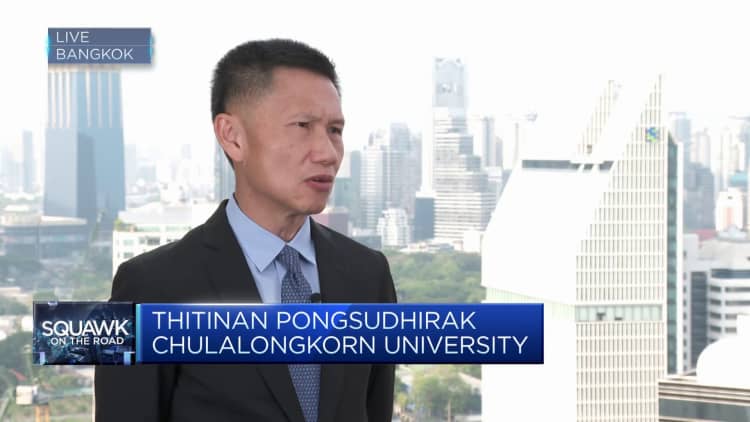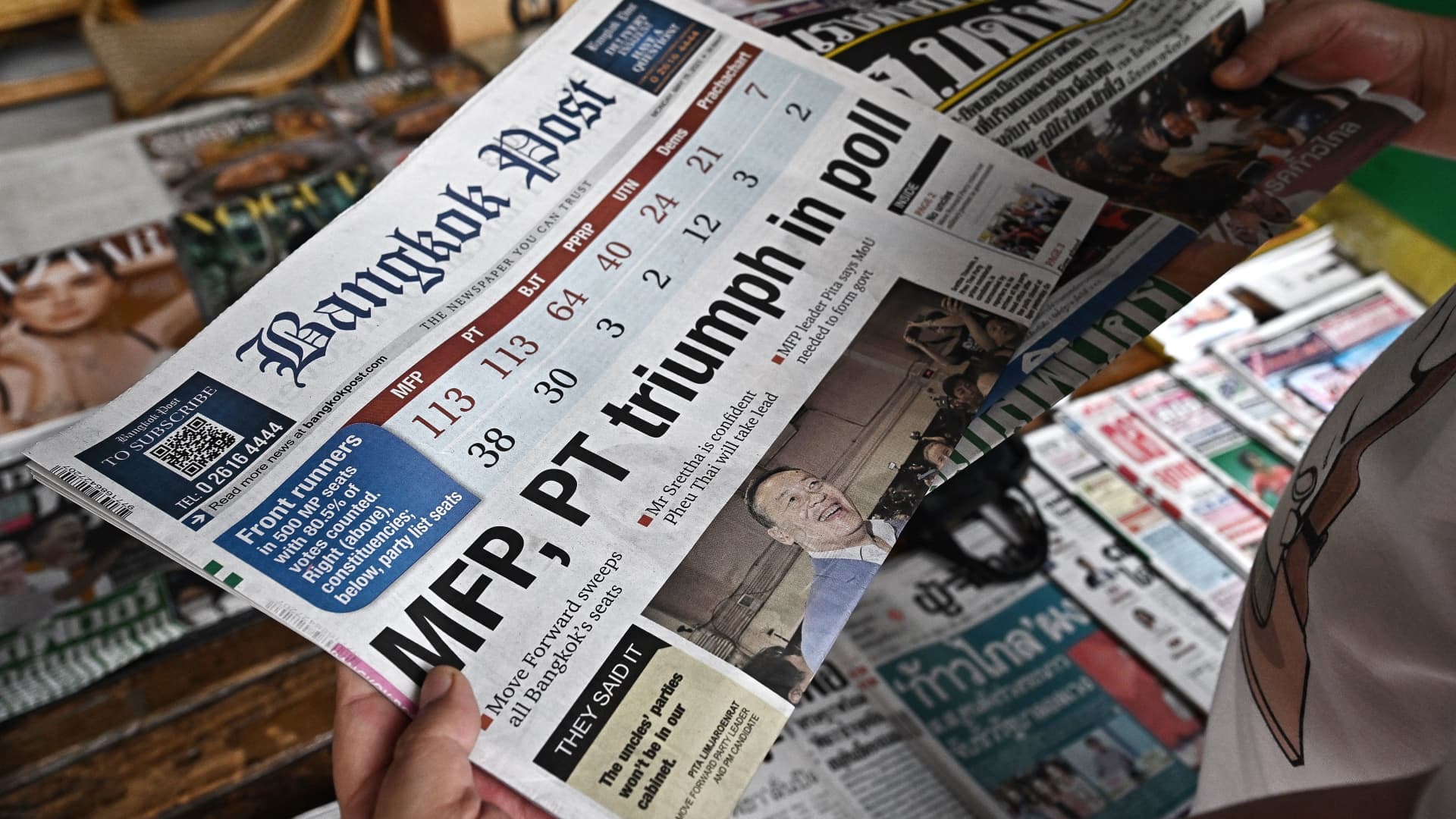A man reads a Thai newspaper featuring front page coverage of Thailand’s general election at a newsstand in Bangkok on May 15, 2023. (Photo by Lillian SUWANRUMPHA / AFP) (Photo by LILLIAN SUWANRUMPHA/AFP via Getty Images)
Lillian Suwanrumpha | Afp | Getty Images
The Thai baht gave up early gains after briefly touching a three-month high on Monday, as investors awaited more tangible outcomes of Sunday’s general election, after preliminary results showed the country’s pro-democracy parties secured a strong majority.
Still, it remains to be seen which parties will eventually form the new Thai government as a coalition is needed since both opposition parties don’t have enough votes to form a new government.
A calculation by Reuters based on data from the country’ Election Commission suggests the anti-military Move Forward party, led by Thai businessman Pita Limjaroenrat, would win the most seats, followed by the Pheu Thai party.
If confirmed, this would represent a resounding rejection of pro-military parties led by former prime minister Prayut Chan-o-cha, ending nine years of pro-military rule.
Official certification of the results are expected to be finalized within 60 days after the polls close.

The Set Composite Index briefly traded 0.3% higher at the open on Monday before paring gains and was last trading 0.2% lower.
The Thai baht strengthened 0.6% on Monday to 33.73 against the U.S. dollar, its strongest level since February earlier this year.
“We have to bear in mind that there have been a lot of tricky business in Thai politics over the years,” Thitinan Pongsudhirak, professor of politics and international relations at Chulalongkorn University told CNBC’s Sri Jegarajah in Bangkok.

“The largest winning party should be able to form the government, but that’s not the case. There are three steps to it: Winning the elections is one thing, forming the government is the second proposition and the biggest challenge to get you on Prime Minister,” he added.
The Pheu Thai party has put forward Paetongtarn Shinawatra — the daughter of former Thai prime minister Thaksin Shinawatra — as its candidate for prime minister, while Reuters reported that Limjaroenrat also has “set his sights set on being prime minister.”
First quarter GDP
Separately, Thailand’s gross domestic product for the first quarter grew 2.7%% year-on-year, beating expectations of a 2.3% rise.
Ahead of the election’s results, Citi economist Nalin Chutchotitham wrote in a Sunday note that Thailand’s economic outlook is likely to be little changed in the following months.
“We expect Q1 GDP growth to remain tepid, but sufficient to signal that the economy bottomed out in Q4 2022, which would support the BOT [Bank of Thailand]’s rate hike,” she said.
Thailand’s central bank’s policy currently stands at 1.75%, and will next meet on May 31. Citi expects the Bank of Thailand to raise its benchmark interest rate by another 25 basis points.
Chutchotitham also expects the new government to be confirmed in August and the economy’s full-year 2023 fiscal budget slated to be announced sometime in the final quarter of the year.
“Over the medium-term, economic outlook could see increased risks of populist economic policies which could raise questions on future fiscal discipline,” she wrote.
What next?
According to Pongsudhirak, there could be unrest “if there’s a systematic subversion, distortion or manipulation of the results we saw yesterday” since Sunday’s elections were “a profound, earth-shaking result for Thai politics over the last two decades.”
“We have been stuck with this Thaksin, anti-Thaksin cycle,” the Chulalongkorn University professor said. “Now, with the Move Forward Party’s victory yesterday, the Thai people have spoken up for change and reform.”
He pointed out that the Move Forward party is “unlike the Thaksin party.”
“First of all, it is not aligned to Thaksin — it has a very different agenda, it is not a populist party per se. It wants institutional reforms of Thailand’s traditional institutions, the military, the monarchy and the judiciary – the root causes of Thailand’s crisis the last two decades.”
Pongsudjirak said he expects a more market-based, progressive economic policy management from any Move Forward-led government, that is pro-foreign investment, anti-monopoly, with more competition being enforced and small- to medium-sized companies “getting a better share of the deal.”
— CNBC’s Jihye Lee contributed to this report.


